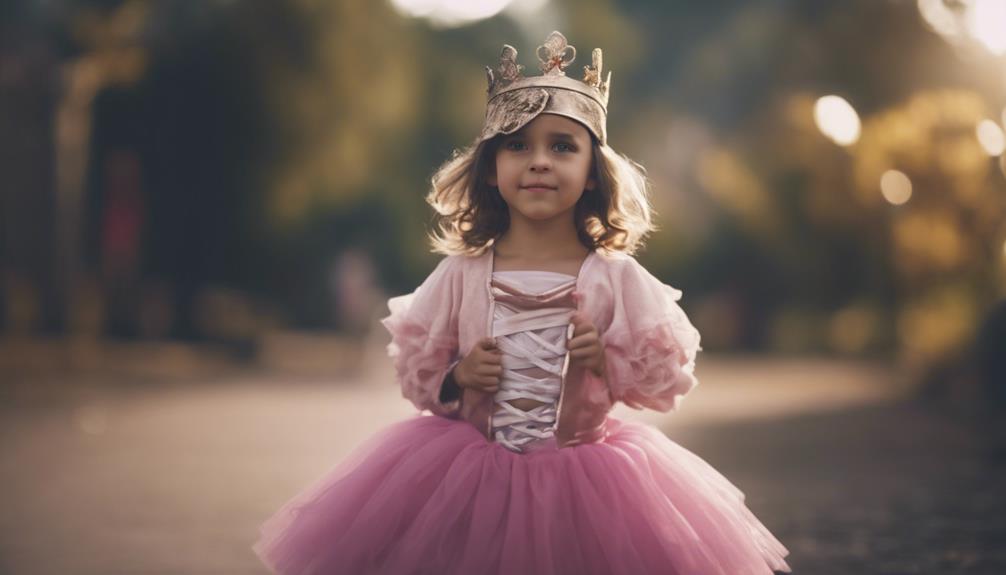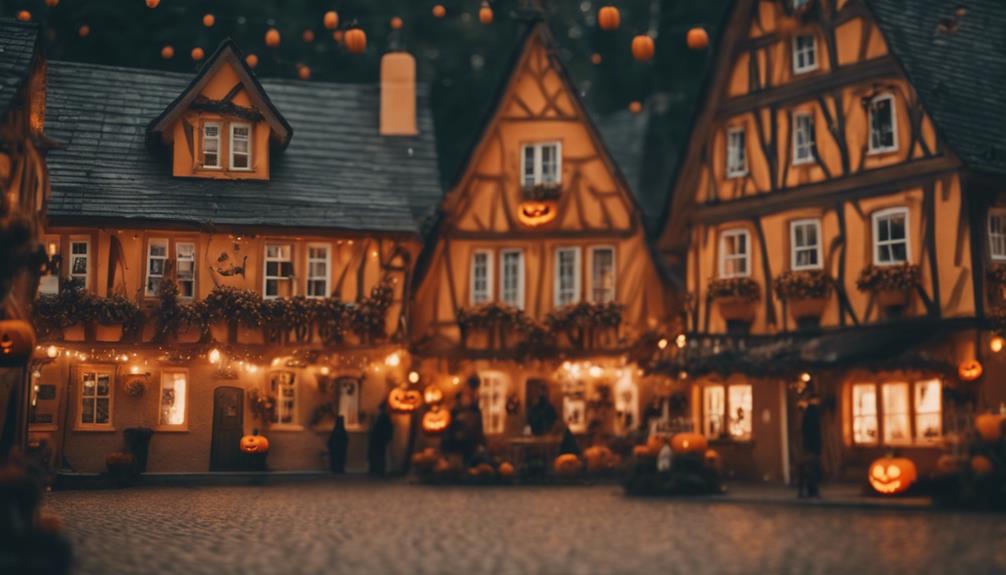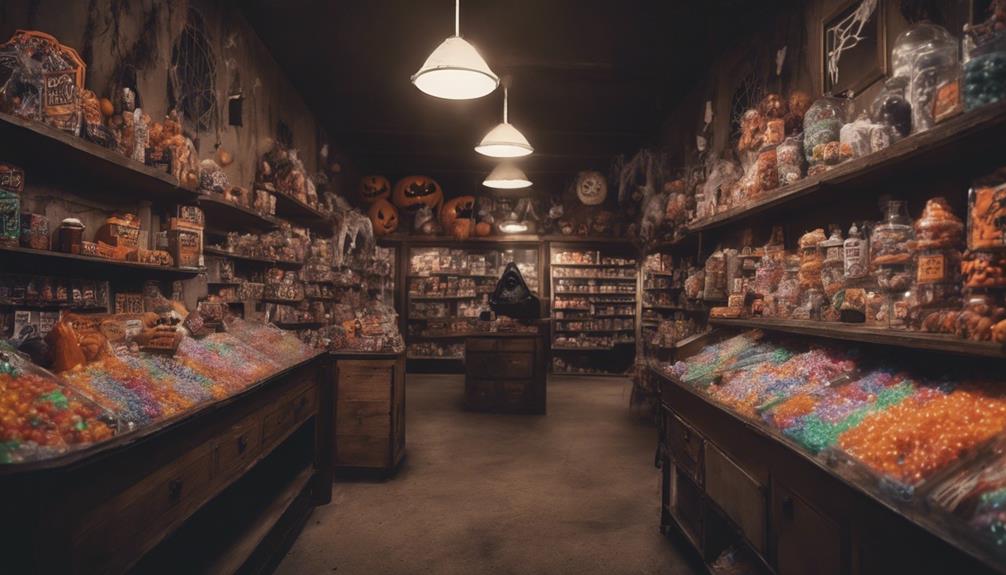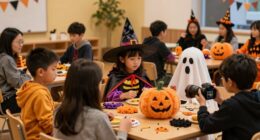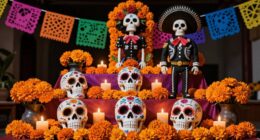Cuba does not traditionally celebrate Halloween. However, the country has shown a changing perspective towards the holiday in recent times. Western influences, especially among the youth in urban areas like Havana, have led to the rise of Halloween parties and events. While Cuba has its traditional Dia De Los Fieles Difuntos customs on November 2nd, some now also embrace Halloween as a way to enjoy and have fun. The younger generation's enthusiasm for Halloween and the commercialization of the holiday in Cuban businesses are shaping its evolving presence in the country's cultural landscape. Discover more about Halloween's impact on Cuban culture.
Key Takeaways
- Halloween celebrations growing in popularity among Cuban youth.
- Increasing number of Halloween events in urban areas like Havana.
- Embracing Halloween as a fun way to celebrate in Cuba.
- Influence of Western culture shaping Halloween celebrations in Cuba.
- Cuban authorities adapting to the evolving attitude towards Halloween.
Historical Perspective on Halloween in Cuba
Initially, Halloween wasn't part of Cuba's traditional celebrations and was considered subversive following the Revolution. The historical perspective on Halloween in Cuba reveals a shift in cultural perceptions over time. While the holiday wasn't embraced in the past, today, some Cuban youth and private English schools host Halloween parties where individuals have begun to enjoy the festivities. This change can be attributed to the increasing commercialization of Halloween, leading to more Cuban celebrations featuring costumes and music.
Despite these shifts, Halloween remains a non-traditional celebration in Cuba. Some hotels may cater to foreign guests, particularly Canadians, by decorating and hosting Halloween events. Additionally, young people in major cities like Havana have started to celebrate Halloween in bars and restaurants, indicating a gradual acceptance of the holiday within the Cuban social scene. This evolving attitude towards Halloween reflects a broader trend of cultural integration and openness to Western influences in Cuba's contemporary society.
Influence of Western Culture on Cuban Celebrations

The growing influence of Western culture on Cuban celebrations is evident through the increasing popularity of Halloween parties among Cuban youth and private English schools. While Halloween is not traditionally celebrated in Cuba, the urban areas are witnessing a rise in Halloween events as some Cubans embrace it as a way to have fun and enjoy costume parties. This shift reflects a broader trend of cultural exchange and adaptation seen in many countries around the world.
To illustrate the influence of Western culture on Cuban celebrations, consider the following table showcasing some key aspects of this phenomenon:
| Aspect | Description | Example |
|---|---|---|
| Halloween Parties | Increasingly popular among Cuban youth and English schools | Private English school hosting a Halloween party |
| Urban Areas | Seeing a rise in Halloween events | Street decorations and costume parades in urban centers |
| Cultural Adaptation | Embracing Halloween as a way to have fun | Cubans enjoying costume parties during Halloween |
Through these examples, it becomes clear how the influence of Western culture is shaping Cuban celebrations, particularly when it comes to embracing Halloween festivities in urban settings.
Traditional Dia De Los Fieles Difuntos Customs

Honoring their deceased relatives, Cuban families observe Dia De Los Fieles Difuntos on November 2nd through traditional customs that include visiting cemeteries, cleaning graves, placing flowers, and lighting candles as acts of remembrance.
This day holds significant cultural importance in Cuban traditions, with families coming together to pay respects to their ancestors. Before visiting the cemetery, an early meal is shared as a way of honoring and remembering loved ones who've passed away.
One of the central rituals of Dia De Los Fieles Difuntos is the evening ceremony of lighting candles at graves, symbolizing reflection and remembrance. By lighting candles, Cuban families express their love and respect for the deceased, creating a solemn and peaceful atmosphere at the cemeteries.
These customs not only serve as a way to remember those who've passed on but also strengthen familial bonds and cultural connections within the community.
Comparison of Halloween and Dia De Los Fieles Difuntos

Celebrating Dia De Los Fieles Difuntos in Cuba contrasts Halloween through distinct cultural practices focused on ancestral remembrance and solemn rituals. While Halloween in Cuba is gaining popularity, it differs notably from Dia De Los Fieles Difuntos with regards to the traditions followed to honor ancestors.
- Grave Cleaning: On Dia De Los Fieles Difuntos, families in Cuba clean the graves of their deceased relatives as a way to show respect and care for their resting place.
- Floral Tributes: It's common for Cubans to place flowers on the graves of their loved ones on this day, symbolizing remembrance and love for the departed.
- Candle Lighting: Lighting candles at the gravesite in the evening is a solemn act of remembrance during Dia De Los Fieles Difuntos, creating a peaceful atmosphere to honor the ancestors.
These cultural differences highlight the deep-rooted tradition of honoring ancestors in Cuba on Dia De Los Fieles Difuntos, distinct from the more festive and commercial aspects of Halloween.
Modern Halloween Trends in Cuba

Modern Halloween trends in Cuba are evolving as Cuban youth and private English schools increasingly host Halloween parties, particularly in major cities like Havana. This shift reflects the growing influence of Western culture on the island, with some Cubans embracing the holiday as a fun way to celebrate with costumes and music.
Additionally, the rise of trunk or treating among foreign families in Cuba showcases an alternative approach to traditional trick-or-treating, highlighting the adaptation of Halloween customs within the Cuban context.
Cuban Halloween Traditions
When considering Halloween in Cuba, one can observe a shift towards modern trends, particularly evident in the emergence of Halloween parties in cities like Havana.
Cuban Halloween celebrations often involve diverse costume themes, including witches, ghouls, and other creative influences.
Young people in major cities like Havana have started celebrating Halloween in bars and restaurants, showcasing a growing interest in the holiday.
Some hotels in Cuba host Halloween parties, especially if there are enough Canadian guests present.
Influence of Western Culture
Reflecting the influence of Western culture, Halloween in Cuba has evolved to embrace modern trends. While not a traditional Cuban celebration, especially in big cities like Havana, some Cubans have started celebrating Halloween, viewing it as more American.
Young people in Cuba now participate in Halloween activities at bars and restaurants, engaging in the modern trend of dressing up and hosting themed parties. This shift demonstrates how the celebration of Halloween in Cuba has adapted to incorporate elements of Western culture, catering to the interests of the younger population.
As themed parties become more popular, the influence of Western traditions on Cuban Halloween festivities continues to shape the way this holiday is observed in the country.
Future Outlook for Halloween Celebrations in Cuba

The growing interest in Halloween celebrations among Cuban youth and in urban centers like Havana indicates a promising future for the holiday in Cuba. As the trend continues to evolve, here are three key aspects shaping the future outlook for Halloween celebrations in Cuba:
- Youth Engagement:
The enthusiasm of Cuban youth towards Halloween festivities suggests a generational shift towards embracing this holiday. Their active participation in Halloween events and parties is driving the increasing popularity of the celebration in the country.
- Influence of Private Institutions:
Private English schools and expatriate communities are playing a significant role in fostering Halloween traditions in Cuba. By organizing themed events and activities, they're contributing to the normalization of Halloween celebrations within the local culture.
- Emergence of New Traditions:
The rising popularity of trunk or treating as an alternative to traditional Halloween activities is reshaping how Cubans engage with the holiday. This innovative approach is gaining traction and adding a unique Cuban twist to Halloween celebrations.
Frequently Asked Questions
Do They Have Halloween in Cuba?
In Cuba, Halloween isn't a widely celebrated holiday. While some hotels may host events for foreign guests, particularly Canadians, the traditional Cuban culture doesn't emphasize Halloween.
However, in urban areas like Havana, younger generations have started to adopt Halloween festivities in bars and restaurants. Overall, Halloween isn't deeply ingrained in Cuban culture, with Dia de Los Fieles Difuntos on November 2nd being a more significant day for remembering ancestors.
Do They Celebrate Day of the Dead in Cuba?
In Cuba, Dia de Los Fieles Difuntos is celebrated on November 2nd, focusing on honoring ancestors. Families clean graves, offer flowers, and light candles, emphasizing respect for the departed.
A tradition deeply ingrained in Cuban culture, this day holds significant meaning. Preceding the cemetery visit, families share a meal, coming together to pay their respects.
This cultural practice reflects Cubans' values and heritage, showcasing their strong connection to their past.
What Is the Most Celebrated Holiday in Cuba?
In Cuba, the most celebrated holiday is Christmas. This festive occasion is marked by family gatherings, gift exchanges, and traditional Cuban cuisine like roast pork.
Additionally, Cubans ring in the New Year with lively parties, fireworks, and the custom of eating 12 grapes at midnight.
Carnival, a vibrant festival with music, dancing, and parades, is another significant celebration in Cuba.
National holidays such as Revolution Day and Labor Day are also widely observed.
What Days Do Cubans Celebrate?
Cubans celebrate Dia de Los Fieles Difuntos on November 2nd. Families honor ancestors, clean graves, place flowers, enjoy an early meal, and light candles for remembrance.
This day has significant cultural importance.
Conclusion
To sum up, while Halloween isn't traditionally celebrated in Cuba, the influence of Western culture has led to some modern trends in the country.
The traditional Dia De Los Fieles Difuntos customs still hold significance for many Cubans, showcasing a blend of cultural influences.
As Cuba continues to evolve and embrace diverse traditions, one may wonder: will Halloween become a more prominent part of Cuban celebrations in the future?

